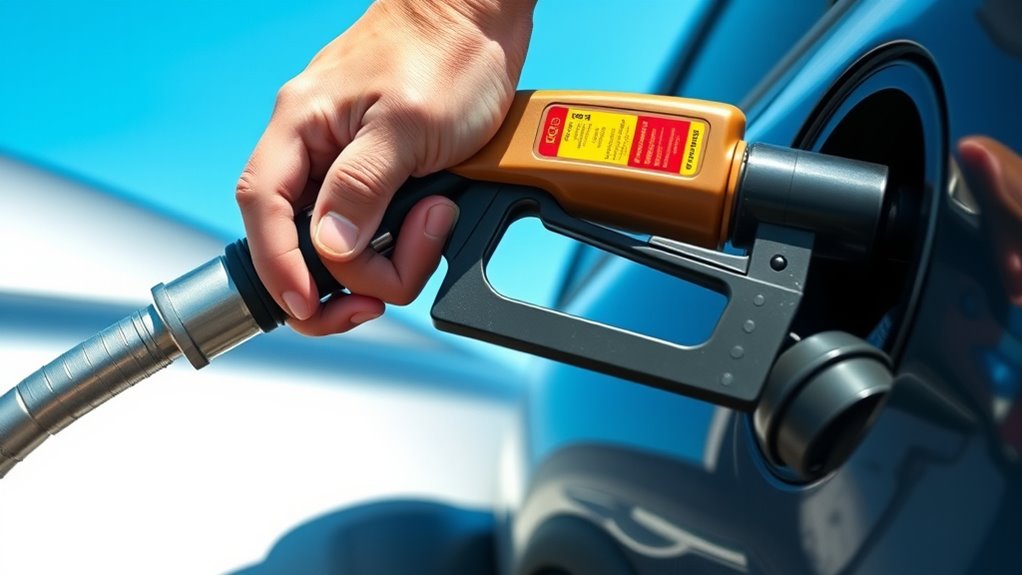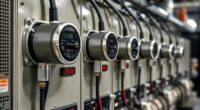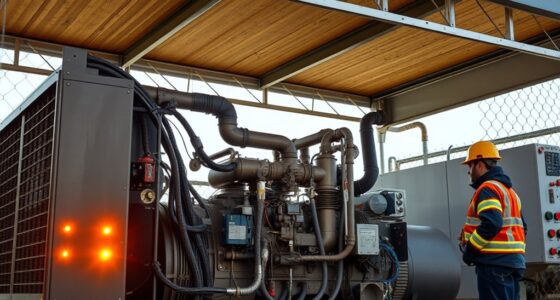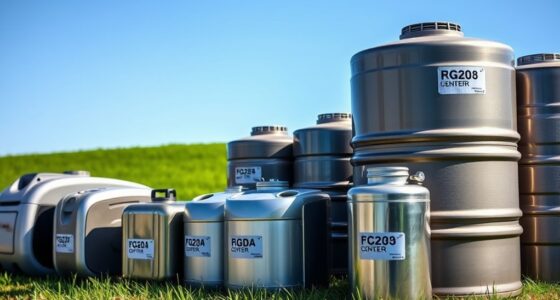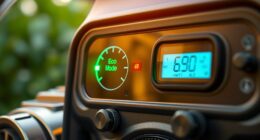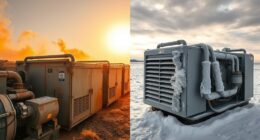To avoid spills and fires during refueling, turn off your engine and avoid distractions. Use the correct fuel containers, tighten caps securely, and handle them carefully to prevent leaks. Never smoke or have open flames nearby, and always refuel in well-ventilated areas away from sunlight or heat sources. If you notice leaks or spills, shut off the supply immediately and clean up promptly. Keep these safety tips in mind to stay safe; you’ll find more helpful advice ahead.
Key Takeaways
- Turn off the engine and remove ignition sources before refueling.
- Use approved fuel containers and tighten caps securely to prevent spills.
- Refuel in well-ventilated areas away from heat, flames, or sparks.
- Avoid distractions and stay alert during refueling to prevent overflows.
- Clean up any spills immediately and contact emergency services if fire occurs.

Refueling your vehicle might seem like a simple task, but it’s vital to follow safety precautions to prevent accidents or injuries. One key aspect is ensuring proper fuel container maintenance. If you use portable fuel containers, regularly check them for cracks, leaks, or corrosion. Damaged containers can leak fuel or pose a fire hazard, especially if they aren’t designed to handle the pressure or vapors properly. Always store fuel containers upright in well-ventilated areas away from direct sunlight, heat sources, or open flames. Keeping them clean and in good condition helps prevent fuel spills and reduces the risk of fire. When refilling, make sure to tighten the caps securely to prevent leaks during transport or storage.
Being prepared with a solid emergency response plan is equally important. Before you start fueling, know what steps to take if a spill or fire occurs. Keep a fire extinguisher rated for flammable liquids nearby—preferably a Class B extinguisher—and ensure it’s in working order. In the event of a spill, avoid using water to extinguish the fuel, as it can spread the fire. Instead, use the extinguisher or absorb the spill with non-flammable materials like sand or commercial spill absorbents. Having a plan to evacuate or alert emergency services quickly can make all the difference. Familiarize yourself with your local emergency procedures and have emergency contact numbers accessible.
Prepare a spill and fire response plan; keep a functional Class B extinguisher nearby.
While refueling, avoid distractions and stay alert. Turn off the engine, remove all ignition sources, and never smoke near your vehicle or fuel containers. If you notice any fuel odors, leaks, or spills, address the situation immediately—shut off the fuel supply, move away from the area, and contact emergency responders if necessary. Additionally, proper fuel container maintenance extends to cleaning up spills promptly and disposing of damaged containers properly. Never attempt to repair a cracked or leaking container yourself; replace it instead. These steps help reduce potential hazards and keep your refueling process safe.
Finally, always follow manufacturer instructions for your vehicle and fuel containers. Staying vigilant about fuel container maintenance and having a well-thought-out emergency response plan ensures you’re prepared for any unforeseen situation. Proper fuel container maintenance is essential for safety, especially in preventing leaks and reducing fire risks. By doing so, you minimize the risk of spills, fires, and injuries, making refueling a safer task for everyone involved. Remember, safety begins with awareness and preparation, even during routine activities like refueling.
Frequently Asked Questions
Can I Refuel My Vehicle in Rainy or Wet Conditions Safely?
Yes, you can refuel your vehicle in rainy or wet conditions safely, but you should take extra precautions. During rainy refueling, ensure the engine is off and avoid using your phone. Use wet weather safety practices by staying dry, avoiding standing water near the pump, and grounding yourself to prevent static sparks. Be cautious and attentive to your surroundings to prevent spills or fires in wet weather.
What Should I Do if I Accidentally Spill Fuel During Refueling?
Think of a fuel spill as a tiny storm—disruptive but manageable. If you accidentally spill fuel, act quickly to prevent hazards. Use absorbent materials or paper towels for spill cleanup, and guarantee proper ventilation. Follow safety precautions by avoiding ignition sources nearby. Remember, swift action minimizes risks and keeps everyone safe. Stay calm, clean up responsibly, and always prioritize safety to turn a mishap into a manageable situation.
Are There Specific Safety Precautions for Refueling Electric Vehicles?
When refueling electric vehicles, you should prioritize battery safety and follow proper charging precautions. Always guarantee the charging port is clean and dry before connecting, and avoid using damaged cables or connectors. Keep the area clear of water or debris, and never force a connection. Monitor the charging process, unplug carefully once complete, and follow manufacturer instructions to prevent electrical hazards and ensure safe, efficient charging.
How Often Should I Inspect My Fuel Cap and Fuel System for Leaks?
You should inspect your fuel cap and fuel system for leaks at least once a month. Regular fuel cap maintenance guarantees it’s tightly sealed, preventing leaks and emissions. Use simple leak detection techniques, like checking for fuel odors or visible drips around the cap and lines. If you notice any signs of leaks, tighten the cap or have a professional inspect your fuel system promptly to avoid potential hazards.
Is It Safe to Refuel Near Open Flames or Smoking Areas?
No, it’s not safe to refuel near open flames or smoking areas because of flame hazards and smoking risks. You should always turn off your vehicle’s engine and avoid any ignition sources during refueling. Staying clear of flames and smoking prevents accidental fires or explosions. Always follow posted safety signs and wait until you’re away from potential flame hazards before starting to refuel. Safety first to protect yourself and others.
Conclusion
Remember to stay alert, stay aware, and stay safe every time you refuel. Handle fuels carefully, follow instructions closely, and never rush the process. By being cautious, by being prepared, and by being responsible, you protect yourself, your loved ones, and your environment. Refueling safely isn’t just about avoiding spills or fires; it’s about ensuring peace of mind, preventing accidents, and maintaining safety every step of the way. Your safety begins with your actions—make them count.
